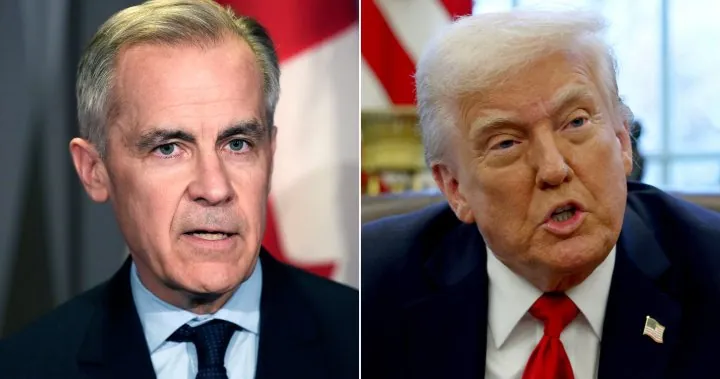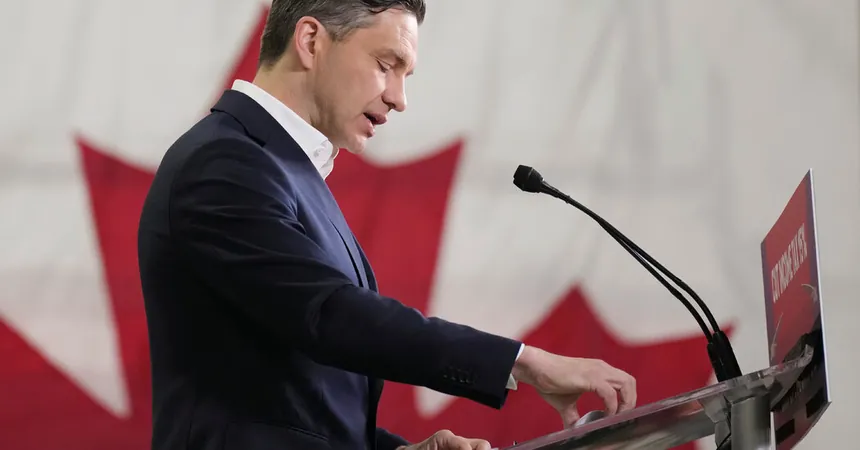
Prime Minister Carney's First Call with Trump: Constructive Yet Tense Amid Trade Tariff Woes
2025-03-28
Author: Jacques
Introduction
Prime Minister Mark Carney has deemed his inaugural conversation with U.S. President Donald Trump 'constructive,' but it carries significant implications for Canada's economy. In their call on Friday, Carney informed Trump that retaliatory tariffs on American goods will be imposed next week as Canada prepares to confront recent tariff announcements impacting its auto sector.
Impending Tariffs and Economic Impact
This call comes at a pivotal moment as Canada grapples with Trump's impending tariffs, which threaten to escalate tensions in trade relations just ahead of the federal election. Starting on April 2, 2025, these tariffs are anticipated to strike the Canadian automotive industry, which is already facing hardships. Furthermore, Canada will be subjected to what are termed 'reciprocal' tariffs on all foreign trade.
Safeguarding Canadian Interests
According to statements released by the Prime Minister’s Office, Carney made it clear that these retaliatory tariffs aim to safeguard Canadian workers and the broader economy. He expressed concerns regarding the impact of these U.S. trade actions during their discussion.
Reactions from Both Leaders
Both leaders touted the conversation as positive, with Trump describing it as 'extremely productive' in a post on Truth Social, deviating from his previous dismissive references to Canada. Notably, Trump acknowledged Carney as 'Prime Minister,' signaling a subtle shift in tone compared to previous interactions.
Future Negotiations and Strategic Focus
Following the upcoming election, the two leaders plan to engage in comprehensive negotiations aimed at reshaping the economic and security relationship between the two nations. Carney is focused on earning the mandate needed to represent Canada in these critical discussions.
Immediate Actions by the Government
In the interim, International Trade Minister Dominic LeBlanc, who is also campaigning for re-election in New Brunswick, will engage in discussions with U.S. Commerce Secretary Howard Lutnick to address immediate trade concerns. The government aims to facilitate open negotiations even as the election campaign unfolds.
Reassessing Economic Strategies
Carney has expressed the necessity for Canada to reassess its economic strategies, emphasizing the need for cooperation and respect in U.S.-Canada relations. He noted that the previous era of deep economic and military ties has been strained under Trump's administration due to aggressive trade measures.
New Tariff Implementation
During the call, it was revealed that Trump had signed an executive order imposing a 25% tariff on imported vehicles and auto parts. These tariffs, set to take effect next week, are expected to add to already existing duties on a majority of Canadian goods and to the 25% tariffs on imported steel and aluminum.
Strategic Meetings Planned
In light of these developments, Carney is scheduled to meet virtually with provincial premiers to strategize retaliatory responses. He highlighted that Canada will respond “forcefully” to U.S. trade actions, though specific measures remain confidential as discussions evolve.
Further Tariff Rounds
Prior to this escalation, Ottawa had already outlined plans for an additional round of tariffs on approximately $125 billion in U.S. goods, which would take effect alongside the new measures. To date, Canada has implemented two previous rounds of retaliatory tariffs amounting to nearly $60 billion.
Political Landscape and Public Opinion
As the April 28 election approaches, Carney has had to momentarily shift focus away from traditional campaign activities to navigate this brewing crisis. His political opponents, including Conservative leader Pierre Poilievre and NDP leader Jagmeet Singh, have also emphasized the need for collective action against Trump's tariffs, even as they campaign on their domestic agendas.
Unified Response Against Trade Hostilities
Both leaders have called for a united front to protect Canadian jobs and the economy from what they deem unjustified trade hostilities. Singh went so far as to declare the removal of Trump’s tariffs as paramount, reinforcing the sentiment that Canada must assert its sovereignty.
Conclusion
The trade war is expected to play a crucial role in shaping public opinion and political strategies as Canadians head to the polls, making it a central theme of the ongoing electoral campaign.









 Brasil (PT)
Brasil (PT)
 Canada (EN)
Canada (EN)
 Chile (ES)
Chile (ES)
 Česko (CS)
Česko (CS)
 대한민국 (KO)
대한민국 (KO)
 España (ES)
España (ES)
 France (FR)
France (FR)
 Hong Kong (EN)
Hong Kong (EN)
 Italia (IT)
Italia (IT)
 日本 (JA)
日本 (JA)
 Magyarország (HU)
Magyarország (HU)
 Norge (NO)
Norge (NO)
 Polska (PL)
Polska (PL)
 Schweiz (DE)
Schweiz (DE)
 Singapore (EN)
Singapore (EN)
 Sverige (SV)
Sverige (SV)
 Suomi (FI)
Suomi (FI)
 Türkiye (TR)
Türkiye (TR)
 الإمارات العربية المتحدة (AR)
الإمارات العربية المتحدة (AR)